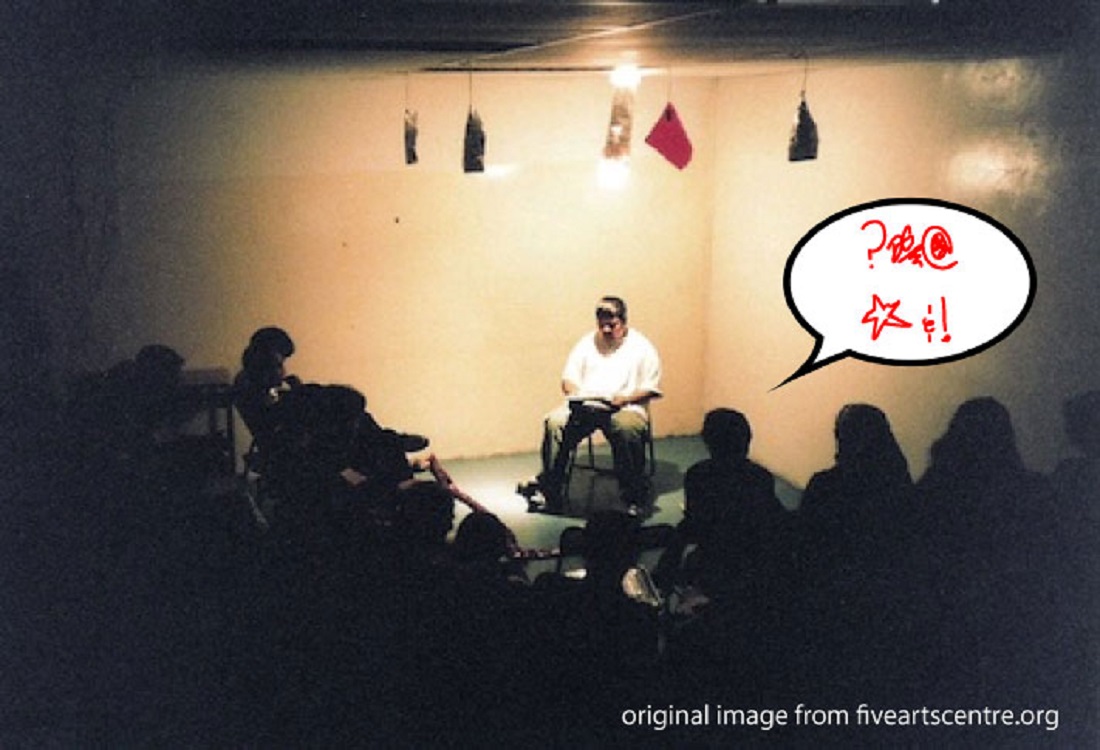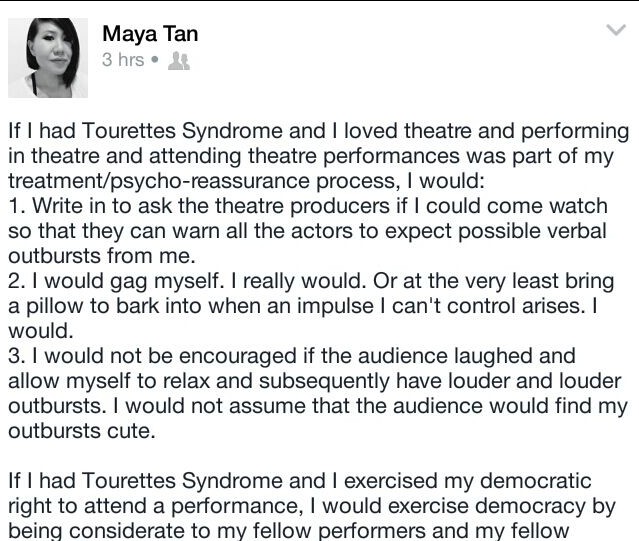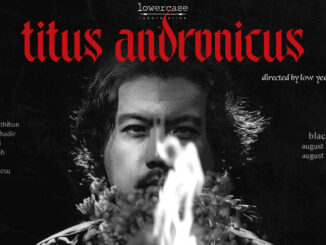So how? Should people with Tourettes be allowed to watch theatre?

- 184Shares
- Facebook174
- WhatsApp4
Over the last two days, we’ve seen a flurry of activity over BFM jock Maya Tan’s post about a certain girl with Tourettes that distracted her from enjoying a theatre performance. As usual with social media, what started out as a single Facebook post…

…has now become national news…

Many people have debated this online, some in support of Maya Tan’s right to watch a theatre play in peace, and others to call out for some consideration for the poor girl with Tourette’s (let’s call her Mrs. T for now).
So let’s get something out of the way first.
Tourette’s is not a preventable condition (and it’s pretty hard to control)

Tourettes is a hereditary condition that affects about 1% of the population and often causes its subject to briefly lose control of their physical movements and speech. Sometimes it manifests itself in physical or speech tics (like just saying “boop beep”) or sometimes in offending ways (called Coprolalia). Most famously, this results in swearing – but that only affects apparently 10% of all Tourettes cases, but also sometimes in things that are just plain offensive, such as poor Ann Khoo, who revealed to TedX KL Audiences last year…

“Once, while at a best friend’s wedding, While they were exchanging their vows and it was sunset, all romantic, there I was in the crowd belting out “SAID I LOVED YOU BUT I LIEEDDDD!”. And I just wanted for the earth to open and swallow me up!” – Ann Khoo at TedX KL (click for video)
What’s important to realise is that these tics are largely uncontrollable, and can be triggered by stressful or exciting events, or any sort of height of emotion. There’s a quote from a college soccer star in the US that sums the condition up quite well.
“Imagine an itch that won’t go away. One so insistent and irritating, you can’t suppress the urge to scratch it. Now imagine that itch inside your head. And I can’t scratch it by hand,” – Leyton Thomassen, The Star Online
In fact, if you’ve ever had an itch, they rarely go away. The more you try to suppress it, the itchier it gets.
“If you can let your tics out that is best because supressing a tic doesn’t make it go away, instead it stores it up for later. It’s a bit like trying to hold in a sneeze. You might be able to hold it in but the longer you do the greater the urge to sneeze gets and then it usually comes out stronger than it would have in the beginning.” – TourettesAction.org.uk
However, while Tourette’s isn’t controllable all the time, does that mean people with Tourette’s should refrain from attending plays in theatre? In other words…
Was Maya Tan right about asking Mrs T to be more considerate?
On the surface it seems that Maya has a very valid point. In theatre (this was a 200-seat hall in DPAC), the actors generally don’t use microphones (according to Uihua, who’s also a part time actor) – which means that everyone’s voice can be equally heard. Even more so than in a cinema, theatre audiences needs to be almost pin-drop quiet, or risk disrupting the audience’s sense of immersion, or worse… the actor’s concentration.
Which is why many theatre performances don’t allow walk in guests that arrive AFTER the show has started…
In this case, while it does seem cruel to ostracise one girl because of her condition, it’s arguably also cruel (or at the least, inconsiderate) to make the entire audience feel drawn out of the play on one girl’s account, or perhaps even more so for the actors who may be distracted by her tics and unable to perform accordingly.
There was a statement made that was heavily panned by the media, but we reckon it does make some sense.

It might seem cold, but the truth is, people paid anywhere from RM35-80 for tickets and it was a Drama, not a comedy… so you can imagine how distracting it would be to hear beeps and boops during tense moments. So it’s Mrs T at fault then?
But sometimes real life isn’t always just about the hero and the villain.

 Here’s the thing. People like blanketing statements like these “Maya should shut her mouth” or “Tourette’s girl should just be more considerate!”, but maybe it’s unnecessary to villainnise either of them?
Here’s the thing. People like blanketing statements like these “Maya should shut her mouth” or “Tourette’s girl should just be more considerate!”, but maybe it’s unnecessary to villainnise either of them?
In Maya’s case, she probably shouldn’t have posted it on Facebook (or feel that Mrs T was encouraged by the reaction to her condition… aiyo) – it would be alot more constructive to talk to Mrs. T (or the organisers) in person. In fact, we’ve heard that she’s since apologised for the outburst, and there’s now a constructive conversation about the whole matter on her status update. Also, we hear that she’s had a private chat with Mrs. T.
As for Mrs. T, there’s an extensive FAQ on TourettesAction.org.uk about how both the person with Tourette’s can still enjoy life, while being considerate to the rest of the world as well.
“Can I do the same things as my friends, like going to the cinema? Having TS shouldn’t stop you from doing anything any of your friends can do, like hanging out in the park, going to the cinema or eating in a restaurant. It’s fine to tic when you are out with friends and family, but you will know if there are some situations that aggravate your tics and you can plan in advance to avoid that. For example, it’s probably best not to go and see a scary movie if you know being scared makes your tics worse.” – Tourettes-action.org.uk
In other words, it’s a fine balance between not hampering your life too much, and yet not inconveniencing others who also have rights to enjoy a play or movie uninterrupted. We’ve heard from various theatre people that Mrs T usually sits in the back row, and tries as hard as she can to not disrupt the show. However, having attended a show myself (a much smaller one with less than 50 audience members), with the same girl present, I can attest that it is indeed a disruptive experience to have her vocal tics in the audience.
There aren’t any easy answers here. In the example of a theatre play, may we make some suggestions?
- If the play is small, perhaps organise a private screening for her and her friends?
- If it is a big production (these kinds of plays are rare in Malaysia), with speakers and everything, she might be less noticable
- For a medium-sized play without a sound system, it might be best for her to skip these?
We’re probably gonna get SOME flak for point #3, but when you think about it, how dissimilar is it to parents not bringing crying children into a cinema? Do we say it’s discrimnatory to want parents not to bring their crying kids in?
At the end of the day, it’s not COMPULSORY for someone to watch a play… just like it’s not compulsory for someone to be able to eat spiceless Indian food. Because of that, the world doesn’t have to cater to ALL people. While it may suck for Mrs. T not to watch one play, it might also suck terribly for the other 99 attendants who can’t immerse themselves in that play after a long week at work, or the actor who can’t perform because he/she is distracted by the tic-cing.
At least in this writer’s opinion, the world should not need to revolve around Mrs. T, but it would be sweet if it could accomodate her every so often. We hear she loves theatre so much that she’s actually acted in more than a few plays.
And when she’s on stage, and in her element, her tics disappear entirely 🙂
- 184Shares
- Facebook174
- WhatsApp4



